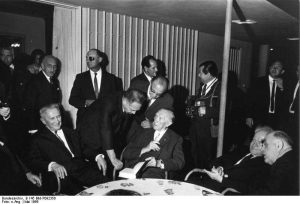
Goldmann, Adenauer, and Ben-Gurion, with Moshe Dayan in the background
(c) Bundesarchiv, B 145 Bild-P092350 / CC-BY-SA 3.0 / https://creativecommons.org/licenses/by-sa/3.0/de/deed.en
In history, singular personalities sometimes play decisive roles. This was certainly the case with Konrad Adenauer, David Ben-Gurion, and Nahum Goldmann.
After the founding of Israel in 1948, the Jewish state was in dire need. Survivors of the concentration camps and Jewish refugees from Arab states were pouring into the country. This was the background for demanding material compensation from Germany although many survivors, who wanted nothing more to do with “German murderers,” vehemently rejected this plan.
Nonetheless, to secure the country’s existence, the Israeli government under David Ben-Gurion had little choice but to signal its willingness to negotiate with Germany. This was highly controversial in Israel. The opposition, under the leadership of Menachem Begin of the Herut Party, rejected any negotiations over “blood money” with Germany. But Ben-Gurion saw no alternative. His foreign minister Moshe Sharett described the dilemma as follows: “Two contradictory demands are being articulated by the public, side by side. One calls for no negotiations, a total boycott. The other says: demand reparations from the Germans. But these two demands cannot both be met (at the same time). We will not receive reparations if we do not negotiate with them.”
International pressure
The Israeli government ultimately decided to hold talks with the Federal Republic of Germany, which was founded in 1949. However, Israel demanded that West Germany first issue a sign of good will. This took place on September 27, 1951. German Chancellor Konrad Adenauer, who had already spoken out in favor of reparations in an interview shortly after taking office, made a speech before the Bundestag: “Unspeakable crimes have been committed in the name of the German people that call for restitution, both moral and material in nature. The government of the Federal Republic is prepared, jointly with representatives of the Jewish people and the State of Israel, which has opened its doors to so many homeless Jewish refugees, to bring about a solution to the reparations problem, and so to help ease the way to spiritual settlement of infinite suffering.”

Many of the German compensations in kind to Israel arrived at the port of Haifa
StateofIsrael / Flickr / 8115445913_144d6320c5_o / (CC BY-SA 2.0) / https://creativecommons.org/licenses/by-sa/2.0/
To pave the way for concrete negotiations, Adenauer went to London on December 6, 1951 for a secret meeting with Nahum Goldmann. Goldmann was President of the World Jewish Congress and head of the Jewish Claims Conference, which he had helped found earlier that year and which represented the interests of Jews in the Diaspora. He had been instructed by Ben-Gurion to propose an amount of $1 bn, the equivalent of 4.2 bn deutschmarks, as the basis for negotiations. After Goldmann cited that figure and explained to Adenauer that the reparations amount must bear a symbolic relationship to the immensity of the crime that had been committed, the Chancellor accepted the offer. On January 9, 1952, Ben-Gurion succeeded in passing, with a narrow majority, a Knesset resolution to commence negotiations. The debate that preceded the resolution had been marked by vehement disagreement and protests that were loud enough to be heard from outside the Knesset’s walls.
The talks commenced on March 21, 1952 in the town of Wassenaar, near The Hague. The head of the German negotiating delegation was Frankfurt University dean Franz Böhm, a man with a reputation for integrity who, like Adenauer, had resisted the Third Reich. In Wassenaar, Böhm’s brief was to play for time, as parallel negotiations were underway in London regarding Germany’s pre-war and post-war debts. Germany hoped to delay the Wassenaar results until the extent of its financial obligations under the impending London agreement became clear.

Jews from Yemen on their way to Israel (1949/50)
Public Domain
The political strategy, advanced mainly by West German Finance Minister Fritz Schäffer (CSU) and his chief London negotiator, the later Deutsche Bank head Hermann Josef Abs, was to link the two negotiations in hopes of reducing the scale of payments to be made by Germany. When Böhm emerged from the Wassenaar negotiations with a reparations amount of 3 bn deutschmarks – less than the amount that had been accepted by Adenauer as the basis for negotiations – Schäffer and Abs objected.
In May 1952, Abs tendered a low-ball offer to the Israeli negotiator. The Waasenaar negotiations were to be suspended, and Israel would receive between 100 and 200 million deutschmarks per year for three years to help bridge the gap. Israel responded with indignation: it would be immoral for the perpetrators to live better than their victims, they said.
In light of growing international pressure, Adenauer realized that his desire to rehabilitate Germany in the eyes of the world was in jeopardy. He allowed his lead negotiator, Franz Böhm, to convince him to honor his moral obligation.
On September 10, 1952, the Luxembourg Agreement was signed by Konrad Adenauer, Israeli Foreign Minister Moshe Sharett, and Nahum Goldmann on behalf of the Claims Conference. The Federal Republic of Germany undertook paying the State of Israel an amount of 3 bn deutschmarks over 12 to 14 years. Another $450 million would be paid to the Claims Conference to help support, resettle, and integrate Jewish refugees living outside Israel.
Boon for German companies
However, the Luxembourg Agreement did not become effective immediately. It still needed to be approved by the Bundestag – where it nearly failed. There were many “no” votes, both within Konrad Adenauer’s CDU/CSU parliamentary group and among his coalition partners, the FDP and the Deutsche Partei. In the end, the agreement was saved by the SPD, which voted to approve the deal en bloc on March 18, 1953. It was the Social Democrats who, under the leadership of Otto Wels, had voted against Adolf Hitler’s “Enabling Act” in 1933; now, they were unified in support of an agreement that helped Germany rehabilitate its reputation in the world. The decision also benefited German industry. The 3 bn deutschmarks were paid mainly in goods and transportation equipment. The follow-up orders were a boon for German companies.
In the end, Konrad Adenauer’s calculation, which was motivated not only by moral conviction but by political prestige and economic concerns, proved a success. David Ben-Gurion was also satisfied with the results. In a 1952 letter to Nahum Goldmann, Ben-Gurion wrote: “For the first time in the history of the Jewish people, which has been oppressed and exploited for centuries … the oppressor and exploiter must return something of his spoils and pay collective compensation for a share of our material losses.”
The Luxembourg Agreement, which would not have come to fruition without the efforts of Nahum Goldmann, also laid the foundation for good relations between Germany and Israel. In 1960, Konrad Adenauer and David Ben-Gurion met. Diplomatic relations were established between West Germany and Israel in 1965.
As a result of this agreement, Germany has, to date, paid more than $60 bn in reparations to Jews. In addition, Germany has contributed twice that amount in compensation for expropriations and in other benefits. However, the term “compensation” was rejected in Israel. Israelis instead use the Hebrew terms pitzuim (reparations) and shilumim (payments).■
